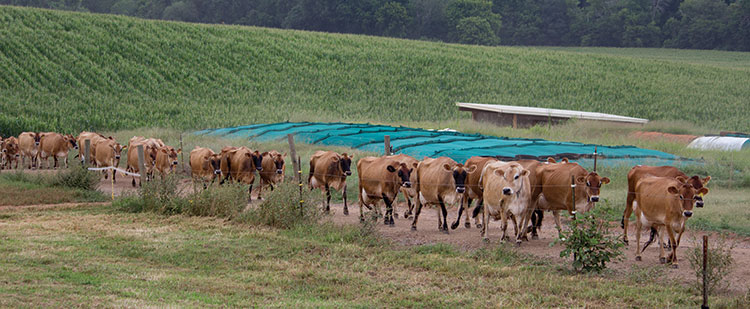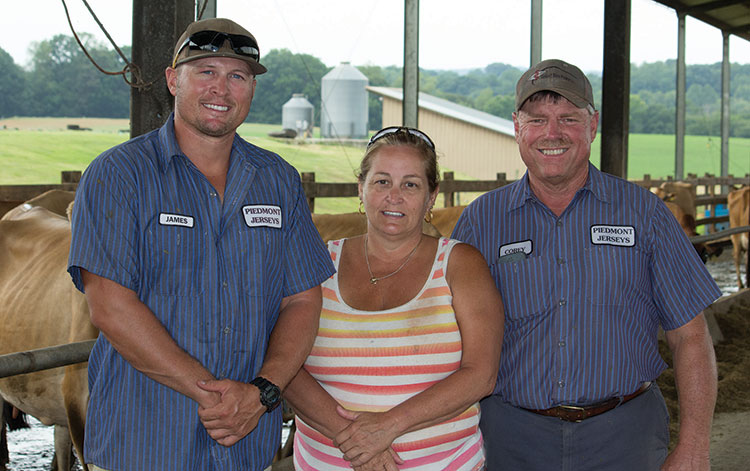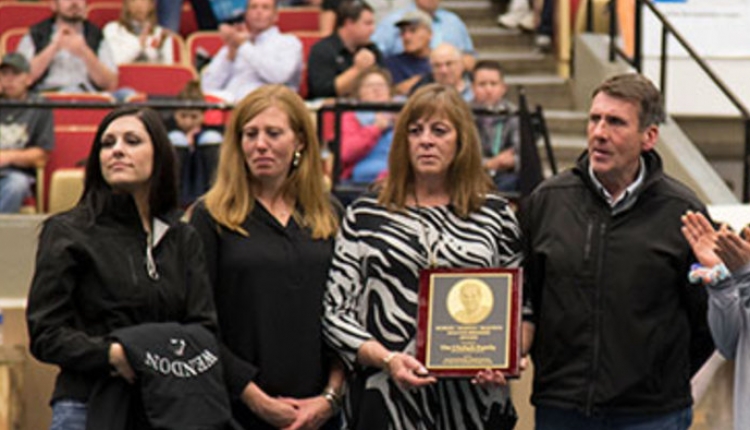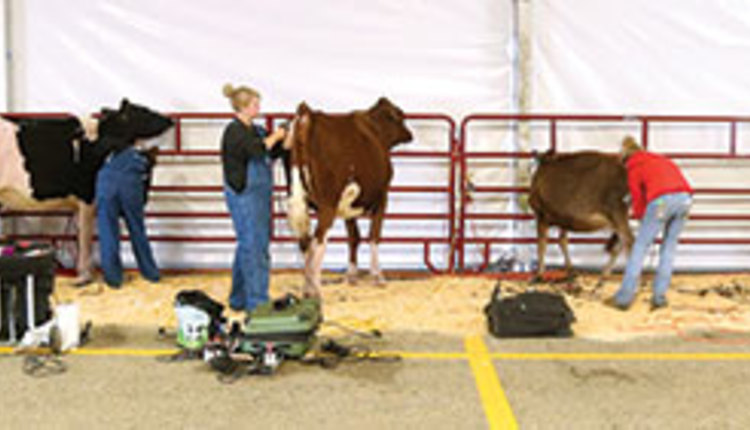
Content Jerseys grazing on lush fields is about as picturesque as a view one can get. For the Lutz family of Piedmont Jerseys, this is daily life on their dairy farm. The herd of Jerseys spends much of its time outside grazing the green hills of the farm’s property.

Located in Lincolnton, N.C., not far from Charlotte, the Lutz family owns and operates their registered Jersey farm. Corey and Bridgette Lutz, and their children James, Mandy, and Olivia, are involved in the operation that has been at its current location since the late 1990s. Currently, James is working full time on the farm.
They milk around 220 cows and also raise their own heifers. The herd averages 18,438 pounds of milk, with 5 percent fat and 3.7 percent protein. Their commitment to breeding deep-pedigree, registered Jerseys while utilizing a year-round intensive rotational grazing system makes Piedmont Jerseys a unique operation. Spending time watching the cows come up from the paddocks, it is easy to tell that the cows come first at Piedmont Jerseys.
Jersey roots
Their current operation was built in 1997 and was designed to be an intensively grazed system. “This environment is better for keeping cows in the herd a lot longer. The grazing system cut a lot of my feed costs and cut the amount of equipment used for harvest. It has worked pretty well,” explained Corey.
Three hundred acres of corn silage, small grain silage, and grass are grown each year. Stored baleage and pasture are the main sources of forage. Since their farm is surrounded by water on three sides, they made the decision to utilize no-till management practices to reduce runoff.
The cows that call Piedmont Jerseys home have deep genetics that stay true to the farm’s breeding philosophy. Corey focuses on selecting bulls with good udders, milk, and type traits. He also looks for sires that come from key cow families.
The family’s commitment to registered Jerseys dates back to Corey’s grandmother, who owned one of the first registered Jerseys in North Carolina. Corey has had a passion for showing cattle since he was a child, and the farm has exhibited at local and state fairs for years. They also exhibit at the North American International Livestock Exposition in Louisville, Ky., and in the Jersey Jug Futurity.
Intensive grazing
“Every time the milking herd leaves the milk parlor, they get a fresh piece of grass, especially in late summer when we have a lot of grass,” explained Corey.
The paddocks are divided into sections for grazing. Each section the milk cows graze is about an acre to an acre and a half in size where they will stay until the next milking. Dry cows are put into larger paddocks and rotated every other day.
Corey has learned that you need high-quality forages for high milk production. Their pastures are seeded with a lot of summer and winter annuals. The Lutzes have noticed the most productivity from ryegrass. They allow cows to graze down to 3 or 4 inches, then remove them until grass is 8 to 10 inches in height. This allows them to eat grass in its most nutritious stage.
The cows are housed all the time on pasture. The milking herd is brought into a barn where they are fed and milked twice daily. The cows come in from the fields at 2 a.m. and 2 p.m. and have an hour to eat before milking begins.
In all, they spend about five hours in the barn, and longer in the summer months to keep them out of the sun. During this time, the cows are fed TMR and milked in a double-8 herringbone parlor. Then they are let out to pasture until the next milking.
Summers in North Carolina are hot, and the Lutzes are committed to keeping their herd comfortable. Once the herd comes into the pen after grazing, they are rinsed with an overhead shower to cool them during the warmer months. Shaded paddocks are also available for the warmest days.
Access to water is also important, and so the Lutzes installed 500 feet of water lines on the farm. Water tanks move with the cows, and the herd never has to walk more than 300 feet to drink.
The Lutzes strive to raise healthy calves that enter the milking string sooner. Calves are fed milk up until 2 months of age. They are raised in hutches for the first 10 to 14 days of life and then moved to a calf barn with individual pens where they are fed milk and starter. Once weaned, calves are moved to pasture. Heifers are bred around 12 to 13 months.
Piedmont Jerseys maintains a hoof trimming schedule of two to three times a year. Corey said the cows need to have good hoof health as they walk a lot. The walking distance depends on which paddock is selected for that day.
A long, productive life
Observing the milking herd making their way to the bunk and parlor, one will notice there are a lot of older cows in the herd. This is a testament to the durable cows the Lutz family breeds.
“I have about four cows over 10 lactations and 40 over five lactations. We have been selling a lot of younger animals each year,” explained Corey.
Visual heat detection is supplemented with heat strips for cows that don’t get bred right away. All cows are bred A.I., and sexed semen is used, particularly on heifers. With a strong breeding program, there is a surplus of heifers each year. Piedmont Jerseys is able to sell a large group of animals each year and profits from the dependable genetics they’ve bred into their herd.
“We sell in regional sales and do some private treaties. A lot of our income that we pour back into the farm comes from selling replacements,” said Corey.
Their farm has earned several awards for their cattle and for environmentally friendly practices. They were also featured as a virtual farm tour during the 2017 World Dairy Expo sponsored by the American Jersey Cattle Association (AJCA). This entailed the making of a video tour of their farm, filmed earlier in the year, which aired during the week of Expo. In addition, the farm enjoyed hosting the National Collegiate Dairy Challenge contest in 2011.
The farm is currently exploring options for on-farm processing as they hope to someday market their products as milk from grass-fed Jerseys. In addition, Corey and Bridgette recently formed an LLC to aid in a future transition to the next generation. They want all of their children to have the opportunity to come back to the farm if they desire.









